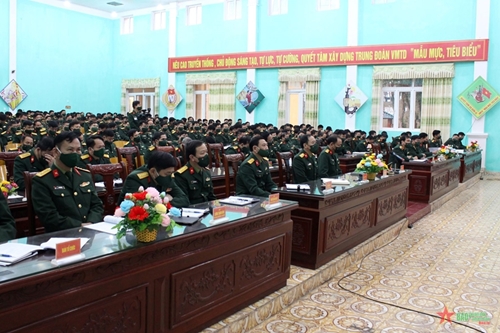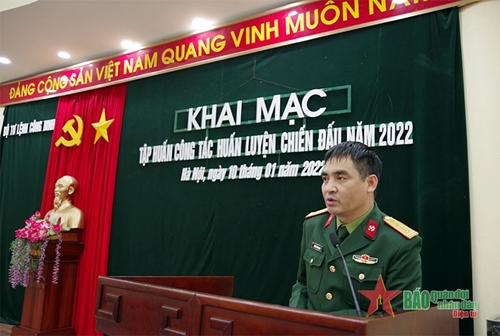Nearly 100 trainees, including officers and chains-of-command of agencies and units under the Military Region 1 Command, participated in the course opened by Military Region 1 at Infantry Regiment 2 of Division 3.
    |
 |
|
Participants at the course opened by Military Region 1 |
During the five-day course, trainees will be updated on new contents of the military, political, logistic affairs and army corps-level techno-tactics, such as actions of on-duty troops, commanding officers, agencies under city-, district-, town-level military commands, shifting in combat readiness postures, handling of discipline violations, and party and political work in defensive area exercises at all levels, among others.
Meanwhile, the combat training course opened by the Engineering Corps saw the participation of 148 officers from battalions and battalion-equivalent or higher-level units.
Within three-days, the trainees will be introduced to major contents of this year’s training tasks, and plan-developing, statistics and training report-making affairs for 2022. They will receive guidance on curriculum implementation and methods of training administration as well as skills to organize party and political work-related activities.
    |
 |
|
Sr. Col. Nguyen Hong Giang, Second-in-Command and Chief of Staff of the Engineering Corps, addresses the event. |
In his speech, Senior Colonel Nguyen Hong Giang, Second-in-Command and Chief of Staff of the Engineering Corps, asked the organizers to follow the set program, the instructors to study the course’s content and update the trainees on new knowledge, and the trainees to acquire the most of what they are provided during the course and exchange experience to apply to their future tasks.
On the same day, the Quang Ninh provincial Military and Border Guard Commands jointly opened a training course at Regiment 244 for 176 cadres from their affiliated agencies and units.
As planned, in four days, the participants will learn new contents in party building, regulations, conclusions, and guidelines of the Party Central Committee (PCC), Politburo, and the PCC’s Secretariat. They will be also briefed on situational developments in the border and border activities, and methods used in defensive area exercises.
Requirements on improving the quality of training, management of troops’ aspirations, skills in information dissemination and on the ideological front on social media, notes in managing and using weapons during combat readiness task performance and more are what the participants will be equipped with as well.
Translated by Mai Huong